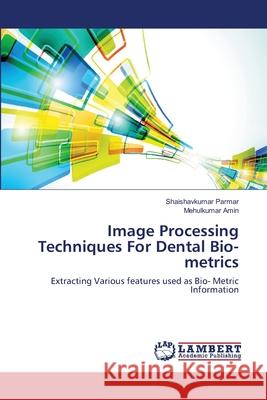Image Processing Techniques For Dental Bio-metrics » książka
Image Processing Techniques For Dental Bio-metrics
ISBN-13: 9783659523533 / Angielski / Miękka / 2014 / 64 str.
Recent growth in the number of studies for automating the process of post-mortem (PM) identification of deceased individuals based on various features of teeth is remarkable. Hence, nowadays dental X-ray has played an important role in human identification. Particularly, in cases of severe accidents (Airplane crashes, 9/11 bombing, Car/Train accidents), natural disasters (Asian Tsunami, Flood, Earthquake, Volcanic eruption, Typical cyclone), etc. wherein other identification clues like fingerprint, iris, face, etc. are not available for human identification. Dental features remain less invariant over longer time period. The purpose of dental image processing is to match the post-mortem (PM) radiograph with the ante-mortem (AM) radiograph based on some features of the dental X-ray images.
Recent growth in the number of studies for automating the process of post-mortem (PM) identification of deceased individuals based on various features of teeth is remarkable. Hence, nowadays dental X-ray has played an important role in human identification. Particularly, in cases of severe accidents (Airplane crashes, 9/11 bombing, Car/Train accidents), natural disasters (Asian Tsunami, Flood, Earthquake, Volcanic eruption, Typical cyclone), etc. wherein other identification clues like fingerprint, iris, face, etc. are not available for human identification. Dental features remain less invariant over longer time period. The purpose of dental image processing is to match the post-mortem (PM) radiograph with the ante-mortem (AM) radiograph based on some features of the dental X-ray images.











